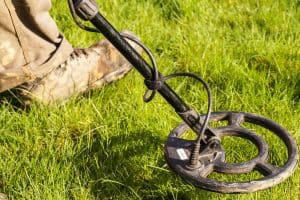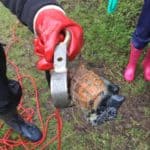
Magnet fishing probably seems like a relatively harmless activity and one that has little legal repercussions.
However, both the US and the UK have specific laws in place that may complicate your magnet fishing.
Understanding these regulations will ensure that you don’t get into any trouble while enjoying your favorite past time.
US and UK Magnet Fishing Laws Vary
Magnet fishing has become reasonably popular in both the United States of America and the United Kingdom because a large number of rivers and lakes contain valuable debris.
But before you start throwing your magnet into any waterway, you need to understand the laws that dictate this activity and how they limit where and when you can fish.
US Magnet Fishing Laws

Currently, in the United States, there are no broad federal, state, local laws banning magnet fishing altogether.
Though some states and local districts may ban magnet fishing in certain areas – which will be discussed in more depth later – magnet fishing is a generally well-tolerated activity that will rarely cause you any difficulties when in the US.
However, this lack of magnet fishing laws doesn’t mean that you can do whatever you want when going out magnet fishing.
Other regulations related to this act – such as salvage, metal detection, and weapon ownership laws – do come into play whenever you find any item.
These will be discussed in more depth below to help you better avoid serious legal problems.
And since magnet fishing is such a popular activity in the UK as well as the US, we should take a look at the laws that are prevalent in the United Kingdom.
These rules and regulations are typically stricter than those in the US, which makes it harder to go magnet fishing.
The UK has stricter laws across the board when it comes to salvaging in any way.
UK Magnet Fishing Laws

As mentioned above, magnet fishing in the UK is a little trickier than it is in the US.
This complication is due to the restrictive General Canal Byelaws of 1965, which was put into place by the former British Waterways.
This group – now known as Canal & River Trust – says that they believe magnet fishing can be “extremely dangerous” and that they don’t allow it in general public areas or waterways that they control.
While the General Canal Byelaws of 1965 don’t specifically mention magnet fishing, they do discuss the dredging of canals, rivers, and waterways and state that no person unauthorized by the Canal & River Trust board can legally dredge waterways.
And as magnet fishing is a method of dredging – in a limited way – most activities of this type can very hard to do in the UK.
The only time that magnet fishing is allowed in the UK is if you are doing it on private property and you have received authorization from the Canal & River Trust to magnet fish on your property.
You must apply for the right to dredge your lakes and rivers in this way.
Authorization isn’t always easy to get, but most people who own private property shouldn’t have difficulty gaining access.
If you don’t own land where you can magnet fish or were unable to get permission, you can magnet fish on the private property of somebody else with authorization.
You will need to obtain permission from that person, first, and ideally set up a written agreement about how you will share the items you find.
Typically, you should split the value of the items in a fair and reasonable way.
For example, you could give them 50 percent of the value of the goods and keep the rest.
This high level might seem unfair to you, but the individual owns the land on which you dredged and should receive some compensation for giving you permission.
Some individuals, though, may demand higher rates for using their property, which can be very frustrating if you can’t find anywhere else to magnet fish.
Make sure to work with somebody whom you genuinely trust to avoid any complications.
What to Do When You Find Weapons
Though most of your finds when magnet fishing should be reasonably straightforward, there may come a time when you find guns, knives, or other weapons in a river or lake.
This situation is always a huge shock and can be a legal problem if you don’t take the appropriate steps.
Again, the UK has stricter laws on this situation, but the US has special regulations as well.
Finding Magnet Fishing Guns
The moment you find a gun while magnet fishing – either in the US or the UK – you’re in a very tough situation.
First of all, any weapon you find in a waterway is in a very questionable legal status.
For example, somebody may have thrown a gun into the river after committing a crime and wiping it of any fingerprints.
Or a hunter may have slipped in the water and dropped a small gun without realizing what had happened.
So if you find a gun while magnet fishing, the first thing to do is put on a pair of gloves before handling it.
You wouldn’t want your fingerprints on a weapon, particularly if it were found to have been used in any crime.
Next, you need to call the police and report the missing gun immediately.
Don’t just assume that you can take the gun home and make it yours – weapons like these come with licenses and can only be owned by the individual who owns the gun.
The police will come and check the gun, identify the serial number, and try to find the owner as soon as possible.
If the police find the owner of the arm and contact them about it, they will try to give the gun back to that person.
However, if they cannot track down the person who owns the firearm or if the person doesn’t want or can’t get it back, you may be able to take ownership of it.
This situation is often complicated and varies wildly between states, so you’ll need to talk to your local authorities first to figure out what process is followed in your state.
In most states, any stolen gun or one was used in an illegal operation is kept by the police.
The laws mentioned above are based on American law, but British gun laws are much stricter and control who can own and control guns more heavily.
If you find a gun while magnet fishing in the UK, you should immediately call the police about it.
However, you should never expect that you’ll get the chance to own the gun.
Pistols, in particular, are not legal in the UK or very strictly controlled to the point where they won’t grant ownership to the person who found it.
So just let the police take care of the situation and get back to magnet fishing for less legally-problematic items.
Finding Magnet Fishing Knives
Knives in the US are much less controlled than guns though there are still regulations that dictate who can own them and when they can be used.
Most statutes of this type are done on a state-wide level and restrict certain types of knives.
For example, Michigan outlaws the sale or possession of spring-assisted or switchblade knives and does not allow the concealment of fixed blade knives on your person or in your vehicle.
Like with all rules of this type, there are exceptions.
For example, hunting knives are not considered a weapon, though they may be used as such because they typically fold in on themselves.
Any blade that folds but which does not use a spring is not considered a weapon and is usually not a problem. However, this situation will vary based on the state so stay abreast of your local laws.
However, the ownership of such knives is typically nowhere near as tricky in the US as the ownership of guns.
Most knives don’t have licenses or specific registration needs.
As a result, a knife you find while magnet fishing is typically yours to own, though you should still follow any restrictions on transportation that your state has put in place.
And if you’re worried about ownership laws, make sure to contact your local police officials to report the knife and see what they have to say.
As you might expect, knife laws in the UK are more restrictive than in America.
For example, people cannot carry a knife in public without “good reason” unless the knife has a folding blade that is three-inches long or less.
Any lock knives are illegal to carry in public without “good reason” and can cause legal troubles.
Good reasons for carrying a knife include if you need to take them to work with you as part of your job, if you’re using them for recreational purposes, if you’re taking them to a museum, among many others.
If you find a folding knife while magnet fishing on private property with permission to magnet fish, the blade is yours to keep.
Just make sure to be careful when transporting it back home and don’t take it out in the public if it has a blade longer than three inches.
If you find lock knives while magnet fishing, call the police and report the knife to them.
Even though the knife may be attractive, you shouldn’t run the risk of legal troubles by trying to take it home.
Magnet Fishing Should Follow Metal Detecting Laws

Although magnet fishing is not the same thing as using a metal detector, the laws that dictate this activity may also impact your magnet fishing.
Typically, metal detection is controlled on a state-wide level and varies depending on various statutes.
For example, people on private property can use a metal detector wherever and however they want, which can make finding metal for your magnet fishing easier.
Typically, metal detection is usually legal in most public places, as well.
However, these activities can be controlled – particularly on any public or state-owned property – by archaeology laws and guidelines.
For example, Michigan’s regulations state that metal detecting is a “legitimate recreational activity” when done in a way that does not violate natural and cultural resources in Michigan.
These rules are particular to state parks but may be enforced in public areas as well.
Any items found on state-owned land – including through magnet fishing – must be reviewed by park staff to ensure that they aren’t crucial for archaeological purposes.
For example, you may find a metal cup that dates back 200 to 300 years during early settlement times.
This item must be reported to the state park officials so that they can assess its cultural and archaeological value.
In many cases, you’re not likely to get the item back but could get a percentage of its value for turning it in properly.
Your magnet fishing must also not damage any public property or deface any natural land.
This aspect is trickier because you may dredge up mud and cause minor erosion to lake and river shores by pulling out your magnet from a lake or river.
Adjusting your fishing methods should help avoid this problem, so make sure that you limit your line length and pull the magnet in a controlled manner.
UK metal detection follows very similar laws to the US – you don’t need a license to use a metal detector but must get permission to use one on private land and cannot search for metal on a scheduled ancient monument or an area with importance archaeologically.
And if you find any gold or silver objects or coins over 300 years old, you must report them to the proper authorities.
These items are considered antiquated and must be reported to the Coroner’s Office within 14 days of finding them.
The proper authorities will examine all items and decide if they are classified as treasures.
Once an object receives this classification, the British Museum takes ownership of it and will display it in one of their facilities.
However, you do receive a percentage of its value as a reward, which makes finding these items beneficial for you as well.
You may be tempted to forego this legal route and try to sell antique items at a dealer.
This step is usually not wise – most dealers will notice the antiquated nature of the object and are likely to call the police on you.
Jail time and fines will be your only reward in this situation. And if you do find a dealer willing to buy obvious treasures from you, they are likely untrustworthy.
Wreck and Salvage Laws May Come Into Play

Although your magnet fishing activities are unlikely to find any item that falls under US or UK salvage laws, this situation may happen in rare circumstances.
For example, you may find a vessel in a large lake or even in the ocean or bits and pieces of items from this wreckage while magnet fishing.
In this situation, wreck and salvage laws come into play and may affect the legal status of your magnet fishing.
Wrecks of this type will vary depending on the situation.
In a case where the owner has abandoned the wreckage, the property may be considered open to anyone who takes possession of it first.
This situation is common in the ocean when derelict ships are found floating or when a crew discovers a wreck.
However, this situation may vary based on many mitigating factors.
If you find a car or a boat with your fishing magnet, you’re not going to pull it out of the lake with your bare hands.
And attaching to such an item is often hard to confirm without diving to the wreck and identifying it.
Simply finding an object such as this does not denote ownership, however, as you must take physical possession of the craft or any items before they are yours to keep.
In the UK, the laws are somewhat similar but slightly different.
For example, all wrecks must be reported to the Secretary of State and the Receiver of Work in the Maritime and Coastguard Agency.
These officials will take a look at any wreck reports and examine who an item could belong to before you take any possession of the goods.
These laws are put into place to be fair to both the finder and the owner of the wreck.
Any debris from that wreck – such as a metal radio or other metal items you dredge up with your magnet – fall under these regulations.
As a result, you may have a tricky legal situation on your hand if you pulled up items that you want to own from a wreck.
You may try to argue that the things you found did not come from the wreckage or were independent of it completely.
In many cases, officials will grant you ownership of items you pull from a wreck – within reason – but will try to ensure that the wreck owner also receives proper compensation.
These laws can often be quite complex to understand without proper legal help, so if you believe that you somehow found a wreck while magnet fishing, contact your local authorities right away.
Recommended Magnet Fishing Kits







